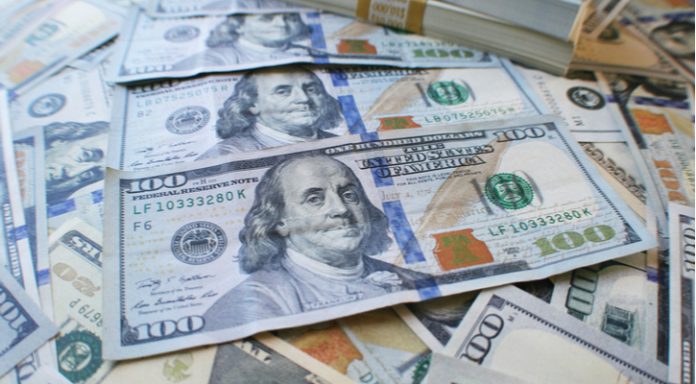The pound finished the previous week just shy of 1.5% higher versus the US dollar. By the end of trading on Friday, the pound US dollar exchange rate was at US$1.4028, after hitting a high of US$1.4146 early on Friday.
| What do these figures mean? |
|---|
|
When measuring the value of a pair of currencies, one set equals 1 unit and the other shows the current equivalent. As the market moves, the amount will vary from minute to minute. For example, it could be written: 1 GBP = 1.28934 USD Here, £1 is equivalent to approximately $1.29. This specifically measures the pound’s worth against the dollar. If the US dollar amount increases in this pairing, it’s positive for the pound. Or, if you were looking at it the other way around: 1 USD = 0.77786 GBP In this example, $1 is equivalent to approximately £0.78. This measures the US dollar’s worth versus the British pound. If the sterling number gets larger, it’s good news for the dollar. |
The pound fell out of favour on Friday after UK retail sale disappointed. Analysts had been expecting retail sales to pick up in January after falling heavily in December. However, the data was underwhelming, at growth of just 1.6%, compared to growth of 2.6% forecast. For two straight months now retail sales have read lower than what analyst were anticipating, raising concerns over the health of household budgets and the state of the UK economy. As prices have been increasing and wages falling in real terms, consumers have been under increasing pressure, which has caused them the rein in their spending. This is bad news for the UK economy which is so dependent on the consumer.
| Why does poor economic data drag on a country’s currency? |
|---|
| Slowing economic indicators point to a slowing economy. Weak economies have weaker currencies because institutions look to reduce investments in countries where growth prospects are low and then transfer money to countries with higher growth prospects. These institutions sell out of their investment and the local currency, thus increasing supply of the currency and pushing down the money’s worth. So, when a country or region has poor economic news, the value of the currency tends to fall. |
Brexit talks over the weekend between UK Prime Minister Theresa May and German Chancellor Angela Merkel, had a positive tone. Merkel said that she was curious to know more about Britain’s aims and was also keen to find common ground on future trade goals. However, the lack of detail regarding the post Brexit relationship could unnerve some pound traders.
US Political Jitters Intensify
The dollar enjoyed a rare day of demand on Friday after a barrage of US data printed higher than what analysts had been anticipating. Housing starts, new building permits and University of Michigan Confidence all helped lift the dollar from its weekly lows.
The economic calendar is very light for the US dollar at the beginning of the week. Investors instead will be digesting political developments in the US. President Trump took to Twitter over the weekend to unleash his fury at the FBI, his security adviser and the Democrats over the indictment of Russians over US election interference. The lashing out came following the indictment filed by the justice department’s Special Counsel Robert Mueller. Trump meanwhile continues to deny any collusion with Russia in the Presidential elections. This is not evidence that Trump was involved in anything illegal, but it will certainly be a distraction for him, taking his attention from other pressing matters and causing jitters among dollar traders.
| How does political risk have impact on a currency? |
|---|
| Political risk drags on the confidence of consumers and businesses alike, which means both corporations and regular households are then less inclined to spend money. The drop in spending, in turn, slows the economy. Foreign investors prefer to invest their money in politically stable countries as well as those with strong economies. Signs that a country is politically or economically less stable will result in foreign investors pulling their money out of the country. This means selling out of the local currency, which then increases its supply and, in turn, devalues the money. |
|
This article was initially published on TransferWise.com from the same author. The content at Currency Live is the sole opinion of the authors and in no way reflects the views of TransferWise Inc. |





